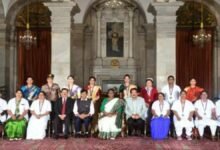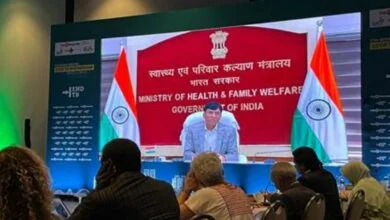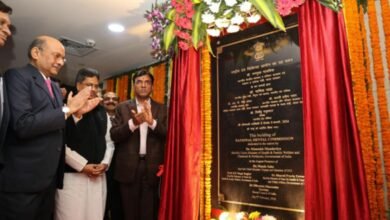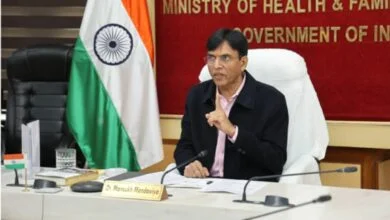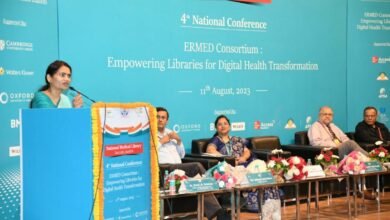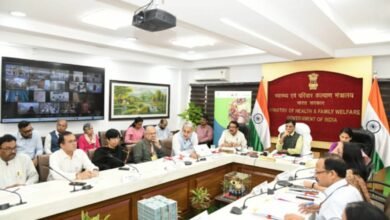Dr Mansukh Mandaviya reviews Public Health Preparedness to COVID19 and National COVID19 Vaccination Progress with States/UT
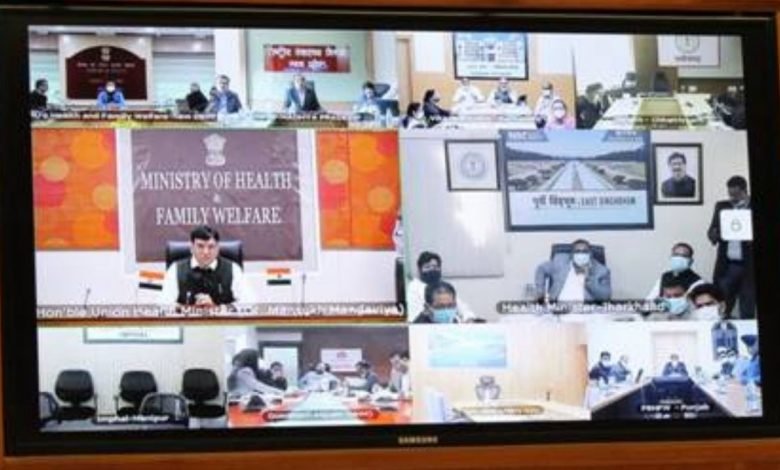
“We have put up a strong fight against COVID earlier and this learning must be used to re-focus on efforts against Omicron variant”
Dr Mansukh Mandaviya, Union Minister of Health and Family Welfare today virtually interacted with State Health Ministers and Principal Secretaries/ Additional Chief Secretaries of States/UTs to review the Public Health Preparedness to COVID19 and progress of the National COVID19 vaccination campaign. The meeting was held in view of the rising cases of the Omicron variant and the recent decisions to roll out vaccination for the age group 15-18 years and precautionary dose for identified vulnerable categories. The meeting was officiated by Union Health Secretary Shri Rajesh Bhushan.
State Health Ministers who joined the meet included Shri S Pangnyu Phom (Nagaland), Shri N K Das (Odisha), Dr Prabhuram Choudhary (MP), Shri Ma Subramanian (Tamil Nadu), Shri Keshab Mahanta (Assam), Shri Anil Vij (Haryana), Satyendar Jain (Delhi), Shri Alo Libang (Arunachal Pradesh), Banna Gupta (Jharkhand), Shri Mangal Pandey (Bihar), Shri T.S. Singh Deo (Chhattisgarh). Ms Chandrima Bhattacharjee, MoS Health (West Bengal) and others.
Dr Mansukh Mandaviya, Union Minister of Health and Family Welfare today virtually interacted with State Health Ministers and Principal Secretaries/ Additional Chief Secretaries of States/UTs to review the Public Health Preparedness to COVID19 and progress of the National COVID19 vaccination campaign. The meeting was held in view of the rising cases of the Omicron variant and the recent decisions to roll out vaccination for the age group 15-18 years and precautionary dose for identified vulnerable categories. The meeting was officiated by Union Health Secretary Shri Rajesh Bhushan.
State Health Ministers who joined the meet included Shri S Pangnyu Phom (Nagaland), Shri N K Das (Odisha), Dr. Prabhuram Choudhary (MP), Shri Ma Subramanian (Tamil Nadu), Shri Keshab Mahanta (Assam), Shri Anil Vij (Haryana), Satyendar Jain (Delhi), Shri Alo Libang (Arunachal Pradesh), Banna Gupta (Jharkhand), Shri Mangal Pandey (Bihar), Shri T.S. Singh Deo (Chhattisgarh). Ms Chandrima Bhattacharjee, MoS Health (West Bengal) and others.
Critical Bottlenecks in Medical Infrastructure Discussed; States urged to better utilize approved funds under ECRP-II
The Union Health Minister noted at the very outset that globally, countries are experiencing 3-4 times the surge in Covid-19 cases in comparison to their earlier peaks. The Omicron variant being highly transmissible, a high surge in the case can overwhelm the medical system. He, therefore, advised the States to leave no stone unturned in ramping up infrastructure to manage a high surge so that India escapes unscathed from this episode of COVID-19.
Dr Mansukh Mandaviya said in this regard that irrespective of the COVID variants, measures for preparedness and protection remain the same. He urged the states to reinvigorate their teams to work at the ground level and strengthen monitoring and containment mechanisms. This was followed by a comprehensive and detailed discussion on various aspects of COVID management including ramping up of hospital infrastructure; increased testing; stringent restrictive measures for breaking the chain of transmission; and stress on COVID Appropriate Behaviour among the masses. Critical bottlenecks in medical infrastructure were also discussed.
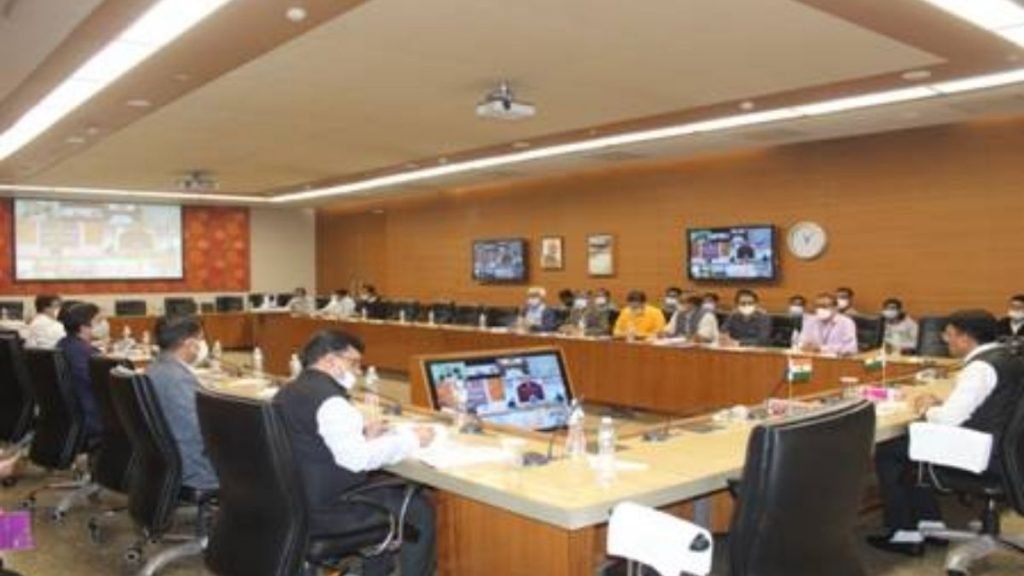
Applauding the dedication and patience shown by state administrations in their fight against the pandemic and in simultaneously ensuring the welfare of the people, Dr Mansukh Mandaviya said, “We have put up a strong fight against Covid earlier and this learning must be used to re-focus on efforts against the Omicron variant.” He stressed the continued need to follow COVID Appropriate Behaviour along with the renewed and stringent focus on containment measures for addressing the present surge.
Underscoring the critical importance of vaccination drive, the Minister observed, “We must focus on planning with regard to the 15-18 age group vaccination and precautionary doses for eligible beneficiaries”. Dr Mansukh Mandaviya also urged states to ensure that the healthcare workers and frontline workers are fully vaccinated, as they form the vulnerable categories.
While appreciating the efforts of States/UTs in achieving the national average of 90% coverage of first dose vaccination of all eligible adults, he urged those states, whose progress of vaccination is below the national average, to ramp up their vaccination campaign. States were also advised to prepare a weekly plan to catch up & exceed the average national vaccination coverage and review the implementation of this plan on a daily basis at the level of Secretary/ACS Health [with special emphasis in 5 poll-bound states of Punjab, Goa, Uttarakhand, Uttar Pradesh and Manipur]
States/UTs advised to share their requirement of vaccine doses through district wise estimation of beneficiaries using Co-WIN
Stressing on the need to ensure smooth implementation of new vaccination guidelines, States/UTs were advised to ensure the orientation of vaccinators and vaccination team members for vaccination of 15-18 years age-group and the identification of dedicated session sites for vaccination of 15-18 years age-group. To avoid the mixing-up of vaccines during administration, separate CVCs, separate session sites, separate queue (if at same session where adult vaccination is ongoing) and separate vaccination team (if at same session site) are to be strived for. States/UTs were also advised to share their requirement of vaccine doses through district-wise estimation of beneficiaries using Co-WIN. They were urged to plan for the distribution of Covaxin to identify session sites well in advance and publish sessions for at least 15 days to provide sufficient visibility.
Dr Mansukh Mandaviya also pointed out that various measures are being taken by the Union Government to ramp up infrastructure development and vaccine production in the country. He requested states/UTs to share their best practices so that the entire country can benefit.
The Union Health Minister brought the attention of the States/UTs to the fact that collectively, they have only used just over 17% of the available approved funds under the Emergency COVID Response Package (ECRP-II). States/UTs were exhorted to expedite the physical progress under ECRP-II in terms of ICU beds, oxygen beds, Paediatric ICU/HDU beds etc. States/UTs were also urged to effectively use IT tools for tele-medicine and teleconsultation, including training and capacity building of human resources, timely availability of ambulances, the readiness of states to operationalise COVID facilities for institutional quarantining, and effective and supervised monitoring of those in home isolation. At the same time, he also urged states/UTs to better utilize the approved funds under ECRP-II and invited any suggestions regarding the same.
Shri Vikas Sheel, Addl. Secretary and MD, NHM spoke on the status of infrastructure development and utilisation of ECRP II funds by states through a detailed presentation. Dr Manohar Agnani, Addl. Secretary (Health) presented the update on the status of vaccination in the country. Shri Lav Agarwal, Joint Secretary, Health Ministry presented a granular analysis of the COVID trajectory in the States and suggested the ramping up of testing, surveillance and containment mechanisms to address the recent surge in cases. Principal Secretary (Health), Additional Chief Secretary (Health) and State Surveillance Officer of the concerned states/UTs offered their feedback and suggestions while discussing their points of concern.
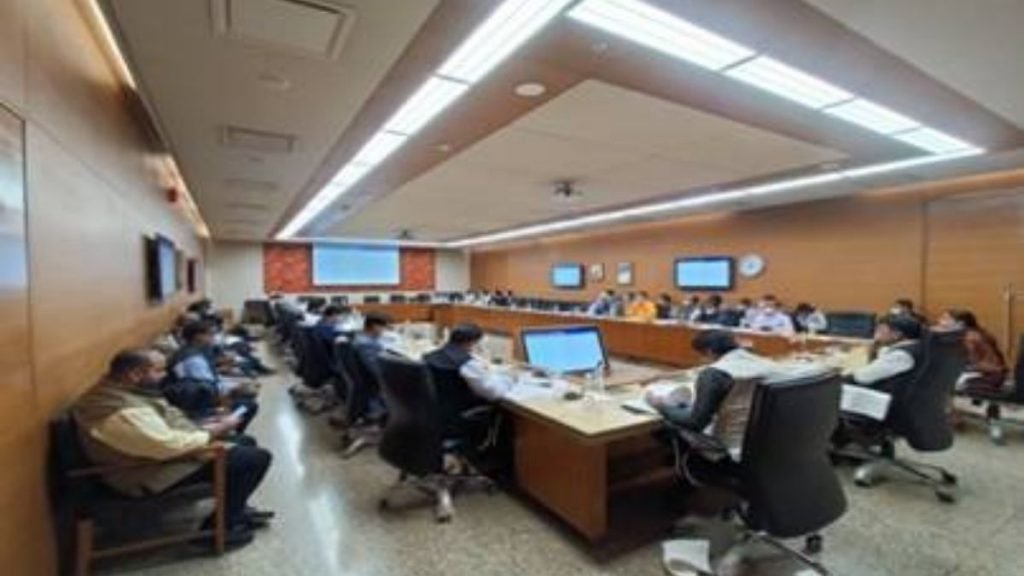
The Union Health Minister noted at the very outset that globally, countries are experiencing 3-4 times the surge in Covid-19 cases in comparison to their earlier peaks. The Omicron variant being highly transmissible, a high surge in a case can overwhelm the medical system. He, therefore, advised the States to leave no stone unturned in ramping up infrastructure to manage a high surge so that India escapes unscathed from this episode of COVID-19.
Dr Mansukh Mandaviya said in this regard that irrespective of the COVID variants, measures for preparedness and protection remain the same. He urged the states to reinvigorate their teams to work at the ground level and strengthen monitoring and containment mechanisms. This was followed by a comprehensive and detailed discussion on various aspects of COVID management including ramping up of hospital infrastructure; increased testing; stringent restrictive measures for breaking the chain of transmission; and stress on COVID Appropriate Behaviour among the masses. Critical bottlenecks in medical infrastructure were also discussed.
Test, Track, Treat, Vaccinate and COVID Appropriate Behaviour to be the mantra for our collective fight against Covid-19
Applauding the dedication and patience shown by state administrations in their fight against the pandemic and in simultaneously ensuring the welfare of the people, Dr Mansukh Mandaviya said, “We have put up a strong fight against Covid earlier and this learning must be used to re-focus on efforts against the Omicron variant.” He stressed the continued need to follow COVID Appropriate Behaviour along with a renewed and stringent focus on containment measures for addressing the present surge.
Underscoring the critical importance of vaccination drive, the Minister observed, “We must focus on planning with regard to the 15-18 age group vaccination and precautionary doses for eligible beneficiaries”. Dr Mansukh Mandaviya also urged states to ensure that the healthcare workers and frontline workers are fully vaccinated, as they form the vulnerable categories.
While appreciating the efforts of States/UTs in achieving the national average of 90% coverage of first dose vaccination of all eligible adults, he urged those states, whose progress of vaccination is below the national average, to ramp up their vaccination campaign. States were also advised to prepare a weekly plan to catch up & exceed the average national vaccination coverage and review the implementation of this plan on a daily basis at the level of Secretary/ACS Health [with special emphasis in 5 poll-bound states of Punjab, Goa, Uttarakhand, Uttar Pradesh and Manipur]
Stressing on the need to ensure smooth implementation of new vaccination guidelines, States/UTs were advised to ensure the orientation of vaccinators and vaccination team members for vaccination of 15-18 years age-group and the identification of dedicated session sites for vaccination of 15-18 years age-group. To avoid the mixing-up of vaccines during administration, separate CVCs, separate session sites, separate queue (if at same session where adult vaccination is ongoing) and separate vaccination team (if at same session site) are to be strived for. States/UTs were also advised to share their requirement of vaccine doses through district-wise estimation of beneficiaries using Co-WIN. They were urged to plan for the distribution of Covaxin to identify session sites well in advance and publish sessions for at least 15 days to provide sufficient visibility.
Dr Mansukh Mandaviya also pointed out that various measures are being taken by the Union Government to ramp up infrastructure development and vaccine production in the country. He requested states/UTs to share their best practices so that the entire country can benefit.
The Union Health Minister brought the attention of the States/UTs to the fact that collectively, they have only used just over 17% of the available approved funds under the Emergency COVID Response Package (ECRP-II). States/UTs were exhorted to expedite the physical progress under ECRP-II in terms of ICU beds, oxygen beds, Paediatric ICU/HDU beds etc. States/UTs were also urged to effectively use IT tools for tele-medicine and teleconsultation, including training and capacity building of human resources, timely availability of ambulances, the readiness of states to operationalise COVID facilities for institutional quarantining, and effective and supervised monitoring of those in home isolation. At the same time, he also urged states/UTs to better utilize the approved funds under ECRP-II and invited any suggestions regarding the same.
Shri Vikas Sheel, Addl. Secretary and MD, NHM spoke on the status of infrastructure development and utilisation of ECRP II funds by states through a detailed presentation. Dr Manohar Agnani, Addl. Secretary (Health) presented the update on the status of vaccination in the country. Shri Lav Agarwal, Joint Secretary, Health Ministry presented a granular analysis of the COVID trajectory in the States and suggested the ramping up of testing, surveillance and containment mechanisms to address the recent surge in cases. Principal Secretary (Health), Additional Chief Secretary (Health) and State Surveillance Officer of the concerned states/UTs offered their feedback and suggestions while discussing their points of concern.

